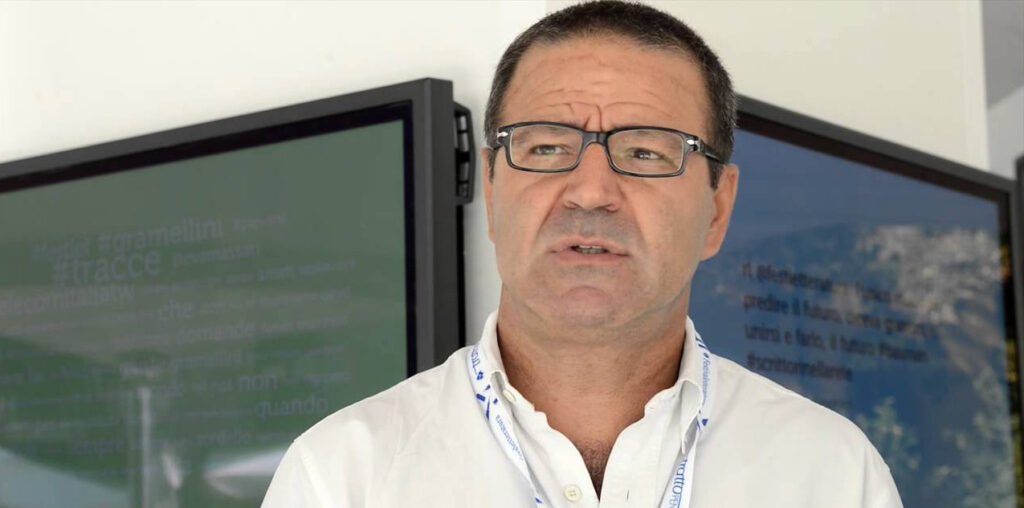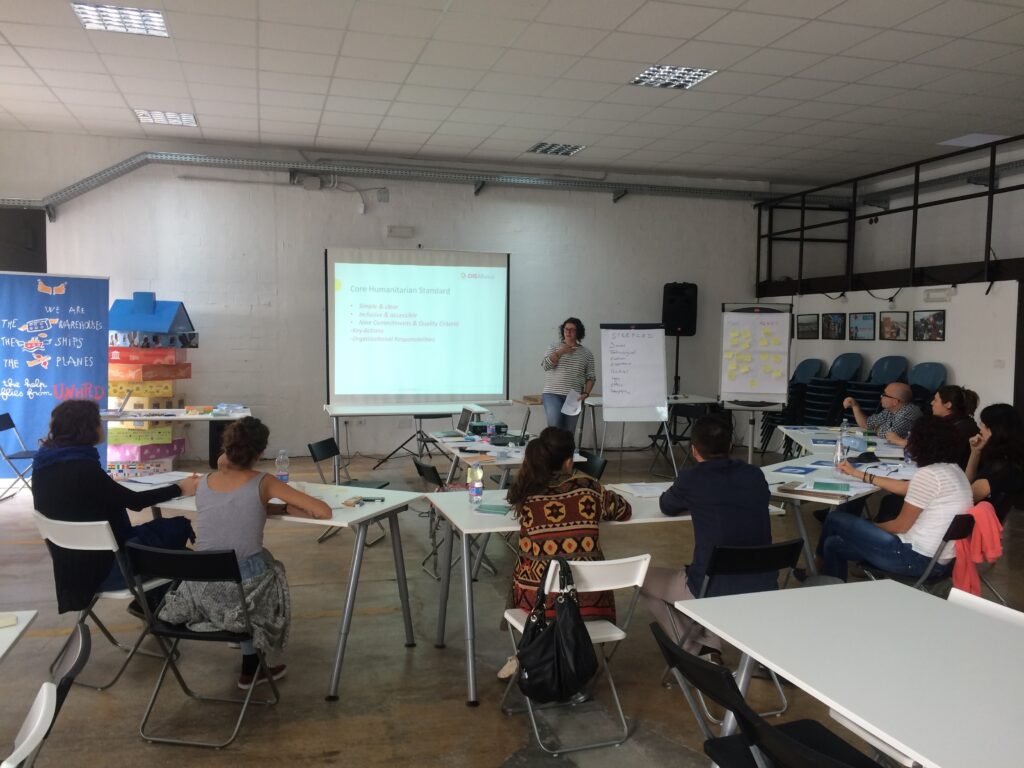Here is “The Protagonists”, a journey for you to get to know better some amongst the main characters of the “worldwide” NGOs. Professionals who fight for the future of the many, who make the difference in the life of millions of people, who challenge themselves, sometimes also putting their safety at risk. People who transformed their passion and commitment on the field, into a work full of meaning.
The first of our Protagonists (with the capital ‘P’!) is Kostas Moschochoritis, General Secretary at INTERSOS, a life on the field in every continent.
INTERSOS is one of the main partners of Master HOPE, and Kostas is amongst the most appreciated lecturers.
“Homo Sum. Nihil humani a me alienum puto” (Terenzio)
Q.: Doctor Moschochoritis, let’s start from the beginning. You started with a technical education: a degree in Electronical Engineering, obtained in Patrasso in the 90s, working as an engineer until 1995. After that, you literally changed your life, and starting dedicating yourself to humanitarian aid. Why did you decide to undertake a career apparently so different from the education you had chosen?
A.: I decided it was time to give a different meaning to my life and my career. Doing something I felt was necessary: I started to collaborate with ‘Médecins Sans Frontieres’. From being responsible for the construction site in Greece, I found myself starting my first mission in Armenia. A very deep and humanly intense experience, in a country, at the time, completely isolated, around which, all the borders were closed. What impressed me most, was the great humanity and dignity of people to whom we were trying to bring help.
Q.: Let’s move to the beginning of your career, the daily life that we face every day. You are Greek. During the past years, Greece has been hit, also more than Italy, by the humanitarian emergency, constituted by the exodus of refugees caused by the instability in Syria. Millions of people escaping, who are in need of everything: maybe, more than anything else, to find once again hope for a normal life. What can we do?
A.: They are people escaping from impossible situations, people who lost friends, relatives, material goods and, above all, the possibility to dream for a future. The first thing to do for them, is to give them back their dignity and hope.
Q.: Doctor Moschochoritis, what do you think about the programmes adopted by the European Union and by individual Member States regarding refugees management?
A.: The agreement with Turkey surely does not make honour to the European Union. Sometimes it almost looks like there is a political will to subcontract the problem of the refugees and to create walls, moving the problem away instead of solving it. To keep it faraway…
Q.: In quality of INTERSOS General Secretary, a Humanitarian Organisation whose motto is, as we remember, “first line of help”, what do you think is the role of the NGOs? And which is the one of third parties governments?
A.: The role of a humanitarian NGO is in its definition, it needs to have a humanitarian aim: it has to alleviate the sufferance, by bringing direct rescue with food and first necessity goods, but it also has to give dignity back to people, I insist on that concept. (Editor’s note, one of the symbolic sentences of INTERSOS is: “they call them refugees, we call them by name”). Moreover, a NGO always needs to be able to take autonomous decisions.
Q.: “Homo Sum. Nihil humani a me alienum puto”. INTEROS’s “mission” is introduced by this famous sentence by Terenzio… What does it mean to be men/women in the 21st century?
A.: It means that we are all equal, all vulnerable. That we can see, perceive, understand everything that happens to us and to our similar, and that we cannot close our eyes.
Q.: Let’s take the stock on some key words that define the values of INTERSOS: “impartial”, “sensible”, “local potentialities”, could you explain us what they symbolise?
A.: “Impartial“ means that every evaluation on the needs, has to be done independently by the involved factions, by the political, religious, social or belonging differences, always keeping the focus on the interest of people in danger or in need.
“Sensible“, because an extreme sensibility is always needed, and comprehension of every personal and cultural aspect met: methodologies and behaviours that respect the cultural and religious contexts are at the base of a good intervention. The relations with populations have to be founded on listening, confrontation and dialogue in order to achieve good results.
“Local Potentialities” it indicates that it is fundamental to actively involve and since the very first moments, the population in the different activities, enhancing the capacities of individuals and communities, since participation of who has been hit by a crisis, when taking decisions, is fundamental, to give value, dignity and hope back.
Q.: How is an intervention set in an emergency area? Is it better to give a fish today, or to teach how to fish it?
A.: A humanitarian NGO firstly has to be faithful to its role: therefore, it has to provide immediate help, the “fish today’” However, the two things are not in opposition; since by helping in the immediate, the basis on how to solve long-term problems can and should be provided.
Q.: Do you ever have any moments of doubt? The fear of not being able to do that? Of not being incisive? In addition, how do we overcome them?
A.: Unfortunately it is a fear, a feeling that can happen often. But it is the same reality to push you forward. I remember about a camp of displaced people in Liberia in the summer 2003: we were distributing food and help, every Tuesday, and regularly, at night time, armed guerrillas came to confiscate everything, threatening and putting into danger the life of people we were trying to help. We were asked by the same population to stop the supply of aids, and we had to do it. But, we cannot cry, we need to stand up and start again.
Q.: As you have just told us, INTERSOS intervenes in areas often object of strong territorial instability: more or less official wars, rebels and armed groups, constant uncertainty. How to organise an intervention in those extreme situations?
A.: The first thing that I want to note is that our security is based on armed protection. We gain people’s trust with our work, dialogue, and negotiating with all the actors on the place and the local population. When this is not possible, when the access to the population is not guaranteed, we should be also ready to take painful decisions, such as, for example, not intervening or withdraw from a specific area.
Q.: Doctor Moschochoritis, you had a long and articulated career, living the most different emergencies in every corner of our Planet: amongst the many Equatorial Africa, South America and the same Italy as well. Which are the most intense memories that you keep?
A.: So many memories. Every mission, every operation left me something. I remember Columbia with great affection, the human warmth and enthusiasm of people we went to rescue. One of the individuals that affected ne the most, was a local driver in Liberia, who, in a morning of New Year’s Eve, despite the difficulties and dangers, and the fact that there was nothing to celebrate about, was very happy and smiling. When I asked him why, he answered: “Because I am alive, and I have a job…” . That man, happy for things that are taken for granted by many, taught me the importance to look at our life from a different perspective.
Q.: What is instead the most difficult situation you have faced?
A.: I would say when, in 1999 we were in an explorative mission in Timor East. Some local militants considered every foreigner as responsible of interferences in the “local affairs”, and they had very hostile attitudes toward them. We were in a small rest stop, when armed men came in, with very violent attitude. Luckily, nothing happened, but after a couple of months, unfortunately there were some victims, amongst which also the staff of international organisations.
Q.: Which are, in your opinion, the skills required from those who want to work in the world of the NGOs? Is a strong motivation enough?
A.: Strong motivation and human values surely are fundamental, but a great professionality is needed as well, intended as the professional capacities and also as the operative diligence. The field is for working, not for learning. Moreover, it is necessary a strong flexibility: you need to be ready to operate in situations that can be very far away from the ideal ones.
Q.: One last question, which suggestion do you feel like giving those who want to be useful by following their own dream, setting their own life in the humanitarian field?
A.: Firstly, to build an appropriate professional background, being very flexible, and a positive capacity of adaptation. In addition, not being scared of questioning themselves…
*This section is published monthly and it is ideated and curated by Guido Pacifici, Journalist and Television Writer, with Marco Crescenzi.



